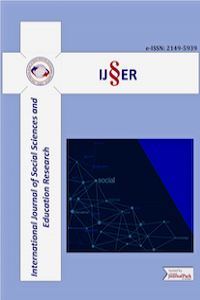Perceptions of health workers in effective use of energy and prevention of technological pollution
Energy sources are not unlimited in the world and energy sources that are not unlimited are consumed rapidly. Energy is very precious and is an essential tool for our survival. In the globalizing world, thanks to technological advances, many facilities have been created, but technological pollution is increasing and all living things are affected, along with humans. If we want to live in a healthy, happy and peaceful life on earth, we must save on energy use, increase the use of renewable energy and reduce technological pollution by using technological tools carefully. We can turn this into an advantage by making small changes in our daily life. In this study, Turkey's major cities, increasing the sensitivity of employees in health care, energy effectively and efficiently to ensure the use, reduce technological pollution and sustainable to create an environment and was conducted in order to create the livable world for future generations. 229 healthcare workers participated in the study by random questionnaire method and face to face questionnaire was applied. Demographic and effective use of energy and technological pollution scale were used in the survey. The collected data were analyzed with statistical package programs used in the social sciences. Descriptive analyzes, T-test and Anova tests were performed. When the efficient use of energy and technological pollution were compared with gender, no significant difference was found between them except for the technological pollution sub-dimension. Technological pollution average scores of men are higher than women. When the efficient use of energy and technological pollution are compared with marital status, there is no significant difference except for the efficient use of energy. It was observed that the average scores of singles inefficient use of energy were higher than those who were married. Efficient use of energy and technological pollution were compared with age range, education level and occupation, and a significant difference was found between the effective use of energy and the efficient use of energy, which is a sub-dimension of technological pollution, and education levels. No significant relationship was found in other comparisons. Necessary suggestions were made at the end of the study.
___
- Akmalı, Özçiftçi, S.( 2010). Ekolojik Binalarda Enerjinin Etkin Kullanılmasının İrdelenmesi, Dokuz, Fen bilimleri Eylül Üniversitesi Fen bilimleri Enstitüsü Yükseklisans Tezi,İzmir
- Atalay, İ. (2013). Doğa Bilimleri Sözlüğü. İzmir: Meta Basım ve Matbaacılık
- Boduroğlu,Ş & Kariptaş,F (2012).Rüzgar Enerjili Etkin sistemlerin Yapılarda Kullanım Biçimleri ,Green Age Symposium, mimar Sinan Fine Arts University 26-27 Nisan 2012,İstanbul, Türkiye
- Bruntland, G. (1987), Our common future: The World Commission on Environment and Development, Oxford, Oxford University Press
- Chontanawata J., Hunta L.C., Pierseb R., (2008). Causality Between Energy Consumption and Economic Growth in OECD and NonOECD Countries: A Panel Data Approach, International Association for Energy Economics,
- Cronbach, L, J.(1951). “ Coefficient Alpha And The İnternatiomnal Structure of Tests”, Psychometrika,16 (3)
- Çerezci,O & Yener,Ş.Ç: (2016). Çevremizdeki Elektromanyetik Kirlilik ve Sağlığımıza Etkileri ISEM2016, 3rd International Symposium on Environment and Morality, 4-6 November 2016, Alanya – Turkey
- Çınar, D, Doğu, S & Meydan, A.(2008). Sınıf Öğretmeni Adaylarının Çevreye Karşı Tutumları. VII.Ulusal Sınıf Öğretmenliği Eğitimi Sempozyumu (2-4 Mayıs), Nobel Yayın Dağıtım, Ankara
- Dağdemir Ö. (2015), Çevre Sorunlarına Ekonomik Yaklaşımlar ve Optimal Politika Arayışları, Gazi Kitabevi, Ankara
